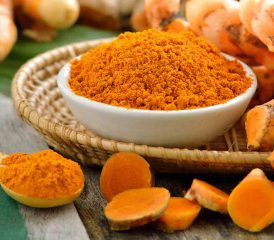When thinking about how to treat mesothelioma cancer, most of us don’t consider the spice rack. Maybe we should — beginning with turmeric.
Turmeric is a deep golden-yellow spice used in Asian and Indian dishes. In addition to its culinary role, turmeric has been used for thousands of years as a traditional medicine.
Research over the past few decades supports turmeric’s anti-cancer activity in the lab. Now, a 2017 study shows turmeric may have anti-cancer activity against mesothelioma cells, too.
This focus on using turmeric against many types of cancer shows the spice may be good medicine indeed.
Turning Turmeric Against Mesothelioma
There are two aspects to the 2017 turmeric and mesothelioma experiment. In both parts, the researchers focused on curcumin, a substance found in abundance in turmeric.
First, they studied how curcumin curbs cell growth in mesothelioma cancer. The researchers found the spice component thwarted mesothelioma by:
Increasing the damage due to oxidation in mesothelioma cells — oxidation is one way some treatments kill cancer cells
Turning on a type of cancer cell death, called apoptosis, which helps the body combat cancer
Improving activity in mesothelioma cells, called autophagy, which is associated with more cancer cell death
Turning down the ability of cancer cells to survive when damaged
Next, researchers examined how curcumin protected mice against mesothelioma tumor development. They placed mesothelioma cells into each mouse’s body through the peritoneum.
The peritoneum is the membrane lining the abdominal cavity. It encloses organs, such as the stomach and intestines. Peritoneal mesothelioma is one type of the disease affecting humans.
Half the mice received curcumin dissolved in corn oil in their abdominal cavity along with the mesothelioma cells. The other half received plain corn oil with the cancer cells.
This type of treatment delivery is called intraperitoneal administration. This is similar to how a chemotherapy treatment called HIPEC is delivered. HIPEC can be used to treat peritoneal mesothelioma.
Compared with the mice who received plain corn oil, the mice who received the intraperitoneal curcumin and corn oil mixture:
Experienced reduced risk of developing tumors overall
Developed fewer tumors
Had much smaller tumors
Lived significantly longer
The study authors noted this information is important to consider when planning future studies of curcumin to treat mesothelioma.
Animal studies do not prove a treatment is effective in people, and this animal study is no different.
However, it does provide vital clues regarding how a human study with curcumin may need to be designed. Taking turmeric orally may not work, but combining it with other treatments delivered straight to the tumor may improve tumor control.
A Spicy Solution for What Ails You
Turmeric has a savory, warm flavor, and it is a staple of many Asian and Indian recipes, including Indian curry dishes.
For thousands of years, the spice has been used to treat a range of conditions, including intestinal gas, worms, gallstones, arthritis, menstrual problems, cuts, bruises, irritable bowels, skin infections, asthma, diabetes, coughs, colds and sore throats.
Modern medicine has taken notice of turmeric, too. More than 3,000 scientific publications on the spice have been published in the past 25 years. Many have focused on turmeric and cancer.
Factors to Consider When Using Turmeric or Curcumin
Turmeric and curcumin are available as dietary supplements. These substances are generally considered safe for most people.
However, you should not take any dietary supplements or over-the-counter medications without first discussing it with your mesothelioma health care team.
Some dietary supplements can interfere with mesothelioma treatment. Only your oncologist and you, working together, can decide if a supplement is safe for you to use before, during or after treatment.
Supplements can interact negatively with your treatments and other medications. These interactions can worsen side effects or render your medical treatments less effective.
A recent medical paper demonstrates in most cases, it is not a good idea to take alternative medicine in place of conventional treatment options such as surgery, radiation therapy or chemotherapy.
Cancer patients who opt to use alternative medicine in place of conventional therapies have shorter survival compared with patients who do use mainstream treatments.
Finally, the digestive tract does not easily absorb curcumin on its own. Only supplements that help the body absorb curcumin are likely to make their way into your body. When taken by mouth, pure curcumin may not reach your tumor effectively.
Ask for What You Need
If you are being treated at a large cancer center, ask your mesothelioma doctor if there are any supportive therapies available to you through their facility.
You may be able to speak with a dietitian for nutrition consultation, try acupuncture or massage, or pursue other options to manage symptoms and improve your quality of life.
If these services are not available, let your doctor know if you plan to pursue them on your own.
The latest studies on curcumin are promising, though they do not prove the spice can effectively treat mesothelioma. Even knowing this, after a cancer diagnosis many people try this and other complementary therapies such as moringa tree leaves, medical cannabis or herbal remedies.
Be sure to keep all of your health care providers in the loop so you can safely pursue the best treatment course for you.
Hi! I am a robot. I just upvoted you! I found similar content that readers might be interested in:
https://www.asbestos.com/blog/2018/03/28/turmeric-curcumin-fights-mesothelioma/
Downvoting a post can decrease pending rewards and make it less visible. Common reasons:
Submit